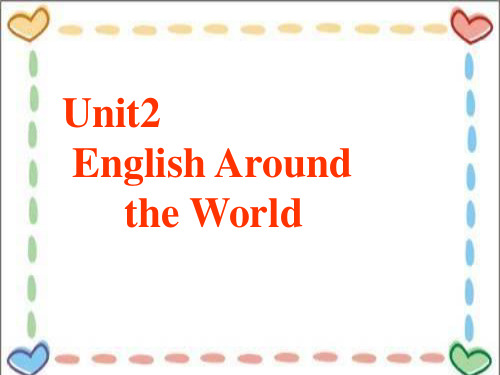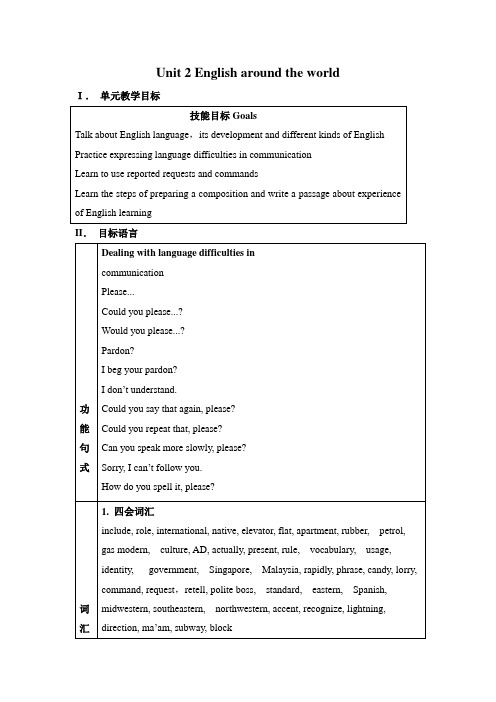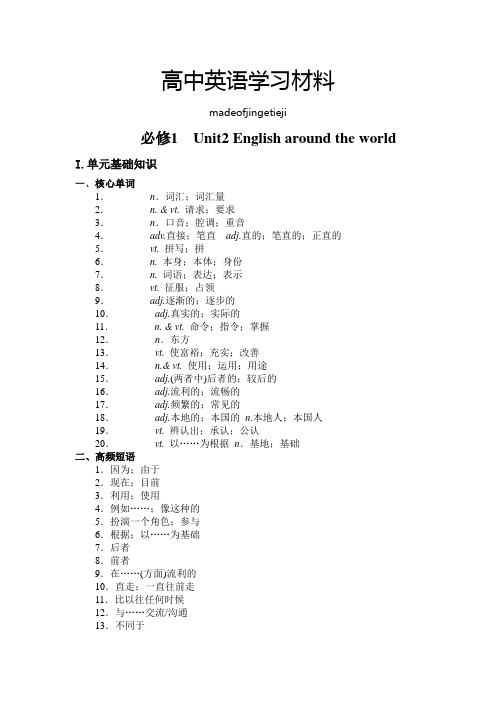人教版高中英语必修一Unit2 English around the world (2)
人教版高中英语 必修一 Unit2 《English around the world---Reading》 课件 (共27张ppt)

Br E
football
Am E
soccer
Br E
lift
Am E
elevator
Br E
flat
Am E
apartment
Read Para 3 and answer the question
Why does English change over time? Because of cultural communication.
Para 1--Development of English
people
the end of the 16th century
England
the next century
Many other countries
today
More people speak in more countries
Para 2
Countries speak English as their:native language
Britain
America
Canada
Australia
New Zealand Ireland
Pre-reading
Read the title “The Road to Modern
English” and predict (预测) what the
English became the language for
_g_o_v_e_r_n_m__e_n_t_a_n__d_e_d_u_c_a_t_i_o_n_.
By the 19th century
Now
The road to modern English
The English language was settled. Two big changes in E__n_g_li_s_h_s_p_e_l_li_n_g__ happened: Samuel Johnson wrote his _d_i_c_ti_o_n_a_r_y_ and Noah Webster wrote _T_h__e_A_m__e_ri_c_a_n__D_i_ct_i_o_n_a_ry__o_f_____
人教版高中英语必修一unit2English_around_the_world课件

Para 3: tells us why English has changed over time.
Para 4: tells us English was settled by two dictionaries. Para 5: tells us English is spoken as a foreign or second language in many countries.
D. Languages change when cultures change
2. From AD 450 to 1150, English sounded more like_____? A. French B. Chinese
C. German
D. Russian
3. Shakespeare’s English was spoken around ______? A. 1400’s B. 1150’s C. 450’s D. 1600’s
The basic structure of the passage Para. 1: state your points of view Para. 2-3: show the supporting reasons Para. 4: get a conclusion
Para. 2-3: reasons
The differences between British English and American English.
BrE autumn typhoon I think colour centre traveller AmE fall tornado I guess color center traveler
人教版高中英语必修一Unit2 English around the world language

n.用法
useful adj.有用的 useless adv.无用的
• __i_n_c_l_u_d_e________v.包括,包含
included adj.包括的,包括在内的
Task2.总结规律
frequently actually , gradually powerful helpful hopeful
wherever, however 等等。 2)as也可以引导让步状语从句,但要把其表语、谓
语或宾语前置,且前置的单数名词不可以加冠词。 e.g.Strange as it may seem,it is true. 尽管这事看上去很奇怪,但却是真的。
Whatever happens, we should keep calm. 无论发生什么事,我们都要保持冷静。
意为:_这__就__是___…__的__原__因_____________________
【仿写】
1)他没有考上大学的原因是因为他没有努力学习。
He didn’t pass the College Entrance Examination,
and__th__is__is__b_e_c_a_u_s_e__h_e__d_i_d_n_’_t_w__o_r_k__h_a_r_d_._____
learning English.
4. This is because in the early days of radio, …(P13) 【句型】This/It is because…+原因
意为:_这__是__因__为___…__…______________________
【比较】This/It is why…+结果
意为:_扮___演__角__色__;___充__当__作__用__________
人教版高中英语必修一unit2 English around the world 教案

Unit 2 English around the worldThe First Period (Warming up & pre-reading)Teaching goals 教学目标●To talk about varieties of English, mainly British English and AmericanEnglish.●To know that English has not only taken different forms in the world but isused in different situations.●T o master some useful words and expressions.Words: picture/movie underground/subway lift/elevator rubber/eraser petrol/gas flat/apartment football/soccer (Br. E & Am.E)officialExpressions: more than one, one another, each other.Teaching materials 教学内容: Warming up, Pre-readingTeaching important points 教学重点●Work together with partners and express one’s opinion on the questions.●Find out the differences between Br. E and Am. E, and distinguish them. Teaching difficult points教学难点●Arouse the Ss’ interests in reading the passage “The Road to Modern English”. Teaching methods 教学方法●Discussing●Cooperative learningTeaching aids 教具准备: PPTTeaching procedures教学过程Step One: Greeting and Leading-in (Discussion and Quiz)1. DiscussionT: Good morning, class! From today we will learn Unit 2 “English around theworld”. Please turn to page 9. This class we will talk about “Warming up”and “Pre-reading”. At first, let’s discuss something.Teacher shows the “discussion”on the screen. Ask Ss to1) look at the following pictures and think in what situations English is used.(T: Please look at the following pictures and think in what situations English is used. Please discuss in groups of four or six, and finish it in 4 minutes.)Teacher shows the pictures on the screen..4 minutes later. Share the discussion results. (T: Time is up, invite some of you to share the results.)2) look at the following world map and find out the countries where people speak English as their native language. (T: Please look at the following map and find out The countries where people speak English as their native language. Let’s do it together.)Teacher shows the world map on the screen.2. QuizT: Now let’s do a small quiz to judge which country’s national flags these are, and think what language is spoken in these countries. Please discuss it with yourpartners, and finish it in 2 minutes.Teacher shows the national flags of some countries in the world map. 2 minutes later, check the results one by one.T: Class, what are the languages spoken in these countries?”Ss: English. T: Yes, English is spoken in these countries.Step Two Warming up (SB. P9)1. Guide Ss to summarize some kinds of English: British English, American English,Australian English, Canadian English and India English.T: Do you know that there is more than one kind of English in the world?Ss: Yes, there are many kinds of English.T: According to the above discussion, what kinds of English are there?Ss: British English, American English, Australian English, Canadian English and Indian English.2.Guide Ss to find out the two major groups of English: Br.E and Am. E.T: What are the main groups of English? Ss: Br.E and Am. E.T: There are two pictures. The first one is .... Ss: BBC T: The second one is VOA.3.Look at two examples and guess what kind of English they speak, Br.E or Am. E.1) Example 1T: Look at the pictures and guess what kind of English they speak, Br.E or Am. E.S1: A speaks Br.E and B speaks Am.E.T: How do you know? S1: There are national flags in their hats.2)Example 2 (conversation)T: I’d like two of you to read the conversation. Other students guess what kind of English A and B speak. S1: .... S2:.... T: Well done, thank you!T: Last class, we have learned that “apartment” and “elevator” are .... Ss: Am.E T: And “flat” and “lift” are .... Ss: Br. E T: So we can know A speaks Am.E, and B speaks Br. E. Now let’s summarize the Am.E and Br. E in the conversation.4.Supplement-----supplement some Br. E and Am. E.5.Exercises1) Match the words that have the same meaning.2) Fill in the blanksStep Three Pre-reading1)With your partner, list the countries that use English as an official language.T: According to the above discussion, list the countries that use English an official language. S3: America, Britain, Canada S4: Australia, NewZealand, South Africa T: Singapore and India.2)Look at the title and guess what the passage is about.T:“The road” means the development of English. “Modern English” shows there are other kinds of English before modern English. So “The road to modernEnglish” may mean the development of modern English.3)●Read the passage quickly and see if you are right.Choose the main idea of the passage.(B)A. How to learn English well.B. The brief history of Modern English.C. The way to England.D. The difference between Modern English andOld English.● Find out the key sentence of each paragraph. (Pair work, 2m)Paragraph 1: Today, more people speak English than ever before.(4th line)Paragraph 2: Native speakers can understand each other even if they don't speak the same kind of English.(1st line)Paragraph 3: Why has English changed over time?(1st line)Paragraph 4: Finally by the 19th century the language was settled.(1st line) Paragraph 5: English now is also spoken as a foreign or second language in South Asia.(1st line)Homework 课后作业1. Review the words and expressions in the passage.2. Read the passage carefully and find out the difficult sentences.3. Finish the exercises of "Comprehending".Blackboard Design 板书设计Unit Two English Around the WorldThe road to modern English Reflection 课后反思。
人教版高中英语必修一教案Unit 2 English around the world (含答案)

Unit 2 English around the world I.单元教学目标II.目标语言III. 教材分析与教材重组1. 教材分析本单元以“世界英语”为中心话题,旨在通过本单元的学习让学生粗略了解世界英语的发展状况,认识各种各样具有民族,地域特色的英语以及它们的出现原因和不同之处。
同时让学生学会语言障碍的表达法,能够区分、转述命令或请求语气的祈使句,并让学生能用所学构思方法写一篇关于英语学习经验的作文。
1.1 Warming Up 介绍世界英语,要求学生区分英美语单词。
此部分的目的是丰富学生有关世界英语的知识。
激发学生对英语发展历史的兴趣。
1.2 Per-reading部分设置了两个与主题相关的问题。
在激活学生已有知识的同时引导学生为下一步阅读做好准备。
1.3 Reading是一篇介绍英语发展史的文章。
文章首先以英语在分布范围上的扩展来陈述英语的发展。
第二段提出英语已发展为多个分支,并举例说明。
第三,四段以时间为顺序,描述英语在不同时期与不同文化的交融,说明世界英语的形成原因,并对中国英语提出设想。
1.4 Comprehending 设计了两个习题。
第一部分以选择题的形式检测学生对课文的理解。
第二部分设置了两个开放性思考问题。
引导学生在掌握课文的基础上联系实际,对英语学习现状陈述自己的观点。
培养学生的思辨能力。
1.5 Learning about Language分词汇和语法两个部分。
词汇部分设置连线、填空等形式的习题,在运用让中学生巩固所学单词及词组,体会英美语言差异。
第二部分讲解了本单元的语法项目(1)学会区分、感悟“命令”与“请求”的语言结构和语气;(2)学习转述他人的“请求”和“命令”的间接引语。
同时给出直接引语和间接引语的用法训练,包括单句的练习和情景语法练习。
培养学生的转述能力。
1.6 Using Language包括四个部分。
以语言实践为目的。
(1) Reading and talking 是一篇阅读材料介绍了英语方言。
人教版必修一Unit 2 English around the world

(太阳)升起;出现;被提及;
(尤指意想不到地)发生;出席, 参加,到场;发芽。
come up with想出;提出(主动) come about发生 come across偶遇;偶然发现(=come upon)
(4)There are some books, pens, erasers and so on in my bag.
8. command
n.[C]命令;指令[U]掌握 vt. & vi.命令; 指挥;支配
n. at one’s command随心所欲地 at/by one’s command奉某人之命 in command of指挥;统帅 under one’s command由……指挥 take command of担任……的指挥 have a good command of很好地掌握
my latest drama.
【提示】play a role/part in是“动词+ 名词+介词”构成的动词短语,这类短 语有两个重要考点:
(1)用名词做主语,用于被动句;
(2)用名词做先行词,用于定语从句。类 似短语有:make use of, pay attention to等。
11. recognize: vt. 辨认出; 承认
recognition n.认出,识别 recognizable adj.可认出的 recognized adj.公认的 recognize sb. /sth. by /from... 根据……认出某人/事(物) recognize sb./sth. as/to be... 承认某人(物)是…… It’s recognized that...人们公认…… out of/beyond recognition认不出来
人教版英语必修一Unit2_English_around_the_world_课件课本

Further thinking
•
Will Chinese English become one of the world Englishes? Why?
Only time will tell.
Further thinking
What are the factors that can influence a language?
Fast-reading
Choose the right answer.
1. English has/had the most speakers ___.
A. when the British conquered __________ many parts of the world ruled B. at present /now C. at the end of the 16th century D. in the 18th century Today, more people speak English than ever before.
Readingຫໍສະໝຸດ PredictingRead the title and guess what the passage is mainly about? The road to modern English
What do you think the word “road” mean in the title?
2. Writing a short passage with the title “the development of English”.
outline
The development of English
The extension of English
人教版高中英语必修一 Unit2 English around the world

高中英语学习材料madeofjingetieji必修1 Unit2 English around the worldI.单元基础知识一、核心单词1.________n.词汇;词汇量2.________n. & vt. 请求;要求3.________n.口音;腔调;重音4.________adv.直接;笔直adj.直的;笔直的;正直的5.________vt. 拼写;拼6.________n. 本身;本体;身份7.________n. 词语;表达;表示8.________vt. 征服;占领9.________adj.逐渐的;逐步的10.________adj.真实的;实际的11.________n. & vt. 命令;指令;掌握12.________n.东方13.________vt. 使富裕;充实;改善14.________n.& vt. 使用;运用;用途15.________adj.(两者中)后者的;较后的16.________adj.流利的;流畅的17.________adj.频繁的;常见的18.________adj.本地的;本国的n.本地人;本国人19.________vt. 辨认出;承认;公认20.________vt. 以……为根据n.基地;基础二、高频短语1.因为;由于 ________2.现在;目前 ________3.利用;使用 ________4.例如……;像这种的________5.扮演一个角色;参与________6.根据;以……为基础________7.后者________8.前者________9.在……(方面)流利的________10.直走;一直往前走 ________11.比以往任何时候________12.与……交流/沟通________13.不同于________14.许多________15.毫不犹豫地________16.讲得通;有意义;言之有理________17.信不信由你________18.被期待做某事;有望做某事________19.被认为是……;被公认为…________20.走近;上来;提出 ________三、重点句型(填空)1.Native English speakers can understand each other ________ ________ they don't speak the same kind of English.以英语为母语的人,即使他们所讲的语言不尽相同,也可以相互理解。
- 1、下载文档前请自行甄别文档内容的完整性,平台不提供额外的编辑、内容补充、找答案等附加服务。
- 2、"仅部分预览"的文档,不可在线预览部分如存在完整性等问题,可反馈申请退款(可完整预览的文档不适用该条件!)。
- 3、如文档侵犯您的权益,请联系客服反馈,我们会尽快为您处理(人工客服工作时间:9:00-18:30)。
高中英语学习材料madeofjingetieji英语必修一Unit2 English around the world基础词汇巩固一.词性转换1.official adj. _________n. _________n. _________adv.2. actually adv. __________adj.3. gradual adj. __________adv.4. spelling n. __________v.5. latter adj. ________(反义词)6. usage n. ________v/n; ____________adj.7. frequent adj. __________ adv. 8. expression n. __________v.9. African adj. __________n.; Spanish adj./n. ________ n. 10. eastern adj. _______n./adj二. 用括号内所提供词的适当形式填空1) What did he _________ say? (actual)2) The __________ cost was much higher than we had expected. (actual)3)My knowledge of physics is pretty _________. (base)4)She used her family's history as a _________ for her novel. (base)5)This novel is ________ on historical facts. (base)6)He is interested in ________ customs. (east)7) The wind is blowing from the __________. (east)三. 单词填空1.His driver's license revealed(揭示) his_________(身份).2.She speaks French ___________(流利)。
3.The __________(航行)from America to France used to take two months.4.I'll give you the keys to my _______________(公寓).5.The little girl is afraid of thunder and_____________(闪电).6.They are n__________ speakers of English.7. I r______________ that I had made a mistake.8. Judging by her a___________, she must be a Southerner.9. His friend is a tall, slim girl with a s______________ nose.10. By the age of two a child will have a v_____________ of about two hundred words.11. The most f______________ cause of death is heart attack.12. Building of the new library should begin in the l__________ part of next year.13. Chinese is the o__________ language of China.14. It is my last r____________. I shall never ask you anything again.15. She looks young, but she's a___________ 50.四. 选择词组填空because of such as play a part in at present make use of come up even ifbe based on believe it or not communicate with at the end of make voyages to1._______________, more than half of our body weight comes to water.2. Nowadays China _______________ important _____________ in the word.3. A number of questions ______________ at the meeting.4.______________ she is working abroad and she will come back next year.5. This play _____________________ a true story.6. We'll have an exam in English _______________January.7. I think you'd better ________________your spare time better.8. _______________we achieve great success in our work, we should not be proud.9. We can now ________________ people on the other side of the world by using internet.10. The football match was put off _____________the terrible weather.五.单项选择1.I command that _______________at once.A. she wentB. she goC. she will goD. she goes2. One can travel there by ship or by plane. Most people choose the ________.A. elevatorB. latterC. lorryD. cab3. The only clue to the ________ of the killer was a half-smoked cigarette.A. accentB. dialectC. nativeD. identity4. No one can ______ what will happen in the future, but if you work hard, you will have a bright future, I am sure.A say B. tell C. speak D. talk5.It is always difficult being in a foreign country, _______ if you don’t speak the language.A. speciallyB. especiallyC. entirelyD. exactly6. He changed so much that I didn’t _______ him at first sight.A. knowB. recognizeC. enjoyD. agree7. Don’t respond to any e-mails ______ personal information, no matter how official they look.A. searchingB. askingC. requestingD. questioning8. He realized she was crying ________ what he had sad.A. becauseB. because ofC. asD. since9. Can you explain how it _______ that you missed the morning classes?A. came acrossB. came toC. came upD. came about10. One of the requirements of the job is __________in two or more African languages.A. fluentB. fluencyC. frequentD. frequency六.句子翻译1. 电脑在我们的生活中起到重要的作用。
(play a part in)2. 直走你就会看到学校在邮局的旁边。
(straight)3.实际上,我们要充分的利用每次机会来练习口语。
(make use of)4.指挥官命令我开枪。
(command;fire)5.他会讲好几种语言,比如英语,西班牙语和法语。
(such as)6.我校学生的数量是1200人。
(the number of)七.重点词汇(旨在提供综合运用所需材料)1. present n. 礼物adj.在场的;目前的vt.赠送make sb. a present of sth.将某物赠送给某人at present/ at the present time目前be present at出席present-day attitudes/fashion现在的态度/流行款式present sb.with sth = present sth. to sb.把某物送给某人[练习] 中译英1). 所有(那些)在场者一眼就看出那个错误。
2). 这本书是哥哥赠送给我的。
2. command n.& v. 命令;指令;掌握command sb. to do sth 命令某人做某事be under the command of 由…指挥,由…控制be in command of 控制…be at one’s command 听任某人支配have / take command of 指挥…command后接that从句时要用虚拟语气[练习] 用适当的介词填空1). For the first time in years, she felt ______ command of her life.2). The army is __________ the king’s direct command.3). The police arrived and took command ________ the situation.3. request n.& v. 请求;要求at sb's request/at the request of sb应某人之请求by request (of sb) 应(某人的)请求; 经(某人之)要求: on request 一经要求:request sth (from/of sb)要求, (尤指)请求某人做某事:[练习] 中译英。
